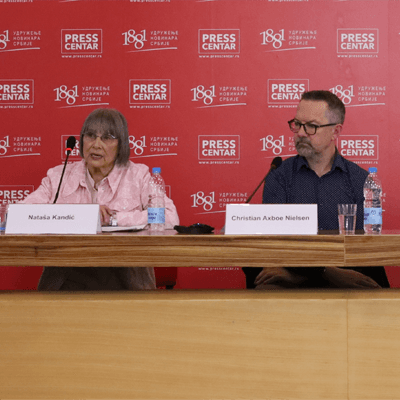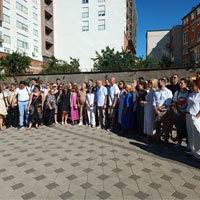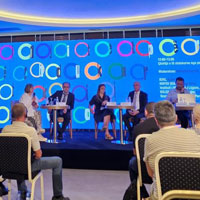 Regarding the indictment issued in absentia by the Special Prosecutor for War Crimes in Kosovo against 53 members of Serbian forces – the Yugoslav Army (VJ), the Serbian Ministry of Internal Affairs (MUP RS), the Special Operations Unit (JSO), and other units – the Humanitarian Law Center (HLC) notes that numerous indictments and trials in absentia in Kosovo are a consequence of the policies of the Serbian authorities.
Regarding the indictment issued in absentia by the Special Prosecutor for War Crimes in Kosovo against 53 members of Serbian forces – the Yugoslav Army (VJ), the Serbian Ministry of Internal Affairs (MUP RS), the Special Operations Unit (JSO), and other units – the Humanitarian Law Center (HLC) notes that numerous indictments and trials in absentia in Kosovo are a consequence of the policies of the Serbian authorities.
The accused are charged with co-perpetration as part of a Joint Criminal Enterprise (JCE) during the execution of the operation “Evil River,” in which 370 Albanian civilians were killed in the villages of Meja, Korenica, Pacaj, Račaj, Nec, Dobroš, Ramoc, and Bistrazin. The victims’ bodies were found in eight mass graves in Batajnica. Over 20,000 people were forcibly deported to Albania, and their property was looted and destroyed.
The Serbian government’s policies include: the relativization of war crimes in Kosovo; protection of high-ranking VJ and MUP officers whose responsibility was established in proceedings against Slobodan Milošević, Nebojša Pavković, Vladimir Lazarević, Dragoljub Ojdanić, Sreten Lukić, and Vlastimir Đorđević; refusal to cooperate with Kosovo’s judiciary; direct political interference in the work of the War Crimes Prosecutor’s Office through demands that priority be given to prosecuting crimes against Serbs, which resulted in indictments being brought against Albanians who are not available to the Serbian judiciary; and the creation of a political and social climate in which international judgments and established facts are interpreted by convicted war criminals.
HLC recalls that the Serbian War Crimes Prosecutor’s Office bears institutional responsibility for failing to act lawfully in 2015, when an EULEX prosecutor issued arrest warrants for 17 individuals, including former head of security for the Priština Corps, Momir Stojanović. Instead of launching an investigation based on ICTY and EULEX evidence, the Prosecutor’s Office issued a political statement claiming that Stojanović did not appear in their records as a “potential perpetrator.”
The Prosecutor’s Office also failed to react when HLC published the dossier “Operation Reka” in October 2015, naming numerous VJ and MUP officers who participated in the operation during which over 300 Albanians were separated from their families and later found in mass graves in Batajnica—many of whom remained employed in Serbian state institutions.
In April 2025, the Special Prosecutor for War Crimes in Kosovo filed an indictment in absentia against 53 members of Serbian forces, either as high-ranking commanders or direct perpetrators. These include: Momir Stojanović (head of security of the Priština Corps), Sergej Perović (chief of security of the 52nd Artillery Brigade), and Milan Kotur (chief of infantry in the Priština Corps). They are charged with participating in the killing of 370 civilians, the deportation of over 20,000 people to Albania through two border crossings, and the looting and destruction of property.
The first hearing is scheduled for June 16, 2025, before the Special Department of the Basic Court in Pristina. The Special Prosecutor will present the case using the testimony of 217 victims, 40 witnesses, and 3 protected witnesses from ICTY proceedings, as well as 26 pieces of evidence previously admitted in ICTY trials. Among the evidence are HLC’s dossier “Operation Reka” and the OSCE report “As Seen, As Told,” published by HLC in 2001.
The established practice in Serbia of shielding high-ranking officers from criminal accountability, combined with the shift to prosecuting Albanians in absentia, and the strategy of Kosovo’s Special Prosecutor – indicting 125 members of Serbian forces in absentia – all point to the urgent need to establish communication between Serbian and Kosovo judicial institutions, with expert involvement from EULEX and the International Residual Mechanism for Criminal Tribunals (IRMCT).
HLC stresses that trials in absentia are a political, not legal, issue and that a solution must be found to ensure that trials are conducted lawfully and produce judgments that are fair to both victims and defendants.







